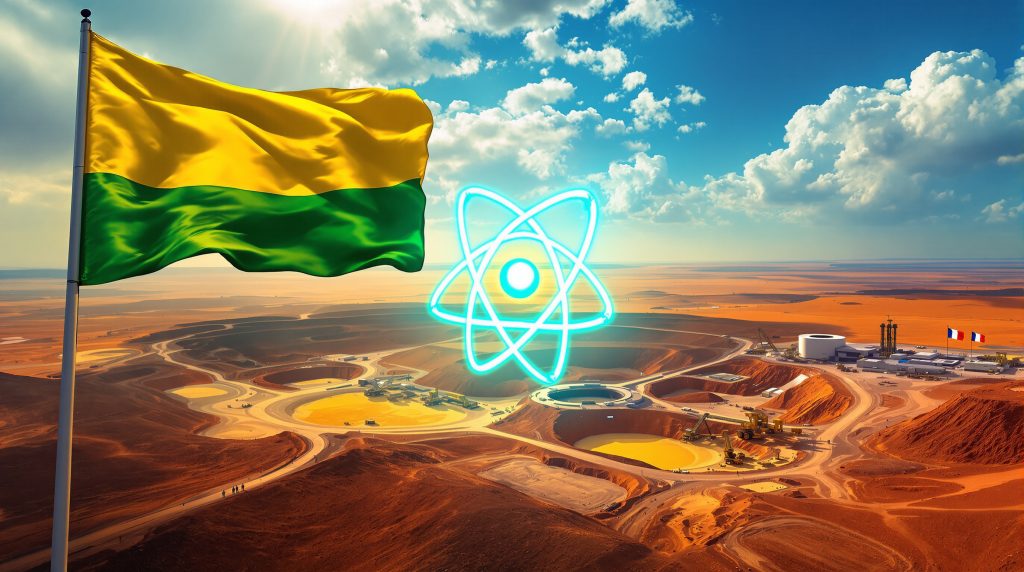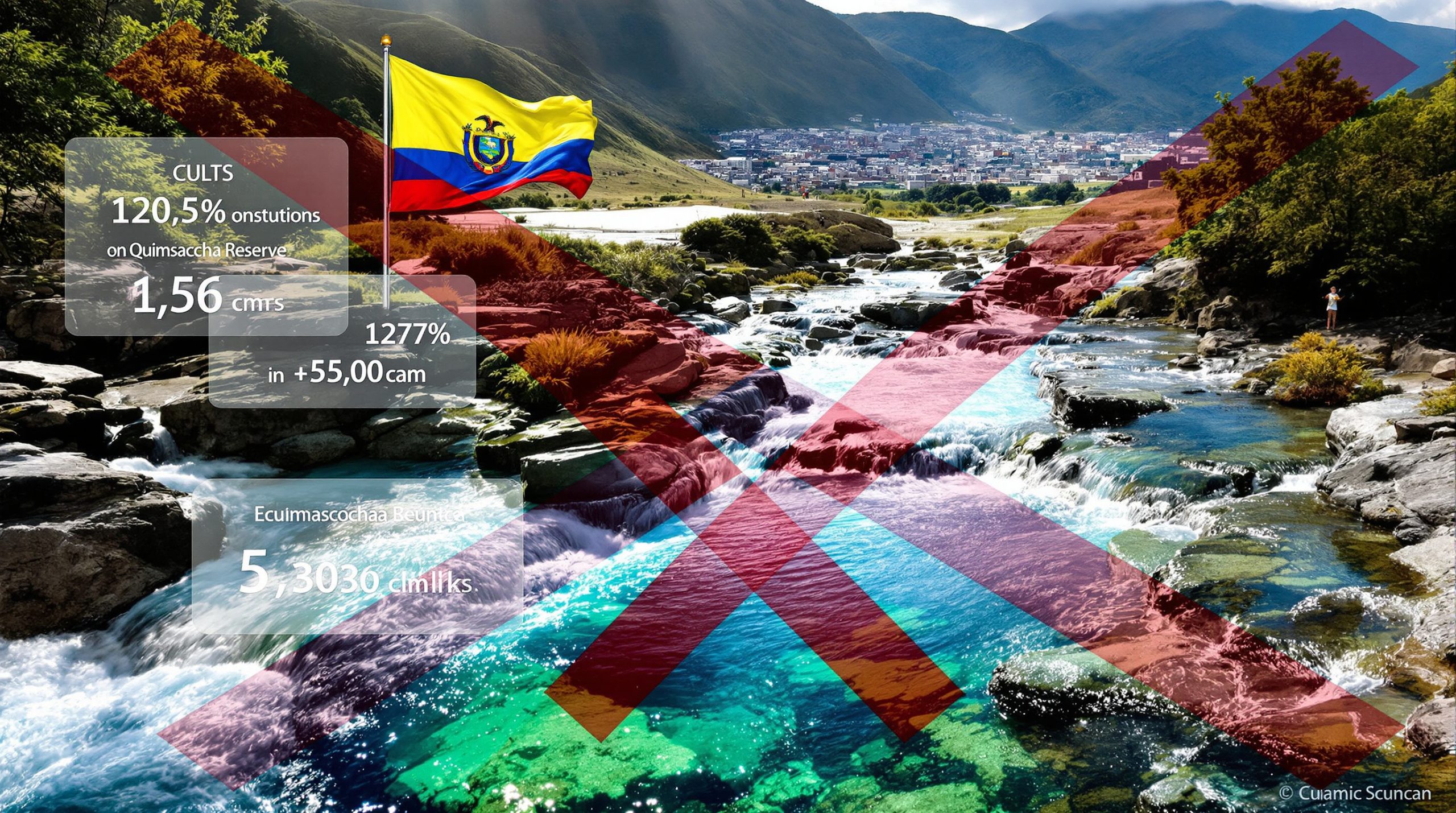What Triggered the Somaïr Uranium Dispute in Niger?
The Somaïr uranium dispute represents one of the most significant resource conflicts in Africa's recent history, stemming from a complex interplay of political transition, resource nationalism, and competing economic interests. At its core, the conflict revolves around the strategic Arlit uranium mine in northern Niger, a critical asset in the global nuclear fuel supply chain.
The Complex Ownership Structure Behind the Arlit Mine
The Somaïr operation functions through a joint venture structure that has become increasingly contentious. French nuclear company Orano holds a majority 63.4% ownership stake, while Niger's state mining company SOPAMIN controls the remaining 36.6%. This arrangement, typical for resource extraction in developing nations, was designed to balance foreign expertise and capital with national resource sovereignty.
Under normal circumstances, the majority stakeholder (Orano) would maintain operational control while the minority partner (SOPAMIN) would exercise oversight rights and receive proportional revenue. This structure had functioned relatively smoothly until the political upheaval in Niger disrupted the established order.
The Arlit mine represents more than just a business asset—it's a cornerstone of Niger's economy. As the world's 4th largest uranium producer, Niger derives approximately 70% of its export revenues from uranium sales, making the Somaïr operation a matter of national economic security.
Political Upheaval and Resource Nationalism
Niger's 2023 political transition created the conditions for the current dispute. Following the coup d'état, the new leadership adopted a more assertive stance on natural resource governance, reflecting a growing trend of resource nationalism across Africa.
This shift in approach manifested initially through subtle operational interference—increased bureaucratic hurdles, delayed approvals, and logistical complications. By December 2023, these tensions escalated dramatically when Nigerien authorities took direct operational control of the Somaïr facilities, effectively sidelining Orano's management team while maintaining the formal ownership structure.
Resource nationalism—the assertion of greater state control over natural resources—has gained momentum globally since 2020, particularly in mineral-rich African nations seeking to capture more value from their extractive industries. The International Energy Agency has noted this trend as a growing factor in energy security considerations, especially for critical minerals essential to the mining industry evolution.
Escalation Timeline: From Operational Interference to Nationalization
The Somaïr dispute followed a clear pattern of escalation:
- Mid-2023: Initial political transition in Niger creates uncertainty around mining agreements
- Late 2023: Increased regulatory scrutiny and logistical hurdles begin affecting operations
- December 2023: Nigerien authorities assume direct operational control of the Arlit mine
- Early 2025: Niger's Council of Ministers announces formal plans to nationalize Somaïr
- May 2025: Detention of Ibrahim Courmo, Orano's in-country representative
- July 2025: Niamey Court of Appeal orders Courmo's release, a directive that remained unimplemented
- September 2025: ICSID tribunal ruling favors Orano's position in the dispute
The progression from operational interference to formal nationalization represents a textbook case of how resource disputes typically evolve. What began as a struggle for operational control transformed into a fundamental question of ownership rights and international investment protection.
How Does the ICSID Arbitration Process Work?
International resource disputes of this magnitude require specialized forums for resolution, which is precisely why the International Centre for Settlement of Investment Disputes (ICSID) exists. This institution has become the primary battleground for the Orano-Niger conflict.
The International Centre for Settlement of Investment Disputes Explained
Established in 1966 through the Convention on the Settlement of Investment Disputes between States and Nationals of Other States, ICSID operates under the World Bank Group's umbrella but maintains judicial independence. The institution was specifically designed to address the unique challenges of investor-state disputes, where power imbalances and sovereignty questions complicate traditional legal remedies.
ICSID provides a neutral forum where both parties—regardless of economic or political power—can present their cases before impartial arbitrators. With 156 member countries committed to its framework, ICSID awards carry significant weight in international law.
What distinguishes ICSID from other arbitration venues is its specialized focus on investment disputes and the binding nature of its decisions. Unlike commercial arbitration, which typically resolves disputes between private parties, ICSID specifically addresses conflicts between foreign investors and sovereign states.
The arbitration process follows structured procedures:
- Registration of the dispute
- Constitution of the arbitral tribunal (typically three arbitrators)
- Written pleadings and document submission
- Oral hearings
- Deliberation and award issuance
This process typically extends over 3-5 years, though urgent matters can receive expedited consideration through provisional measures.
Case ARB/25/8: Orano's Legal Strategy Unveiled
Orano's approach to the Somaïr dispute demonstrates sophisticated use of international investment protection mechanisms. Rather than filing a single comprehensive case, the company initiated multiple arbitration proceedings targeting different aspects of Niger's actions.
Case ARB/25/8 specifically focused on the immediate concern of uranium production and sales rights. By seeking provisional measures to prevent Niger from selling uranium produced by Somaïr, Orano established protection for its most immediate commercial interests while broader ownership questions could be addressed in separate proceedings.
This strategic disaggregation of claims reflects best practices in international investment disputes, where securing immediate protections often takes precedence over comprehensive resolution. By focusing first on uranium sales—the most liquid and immediately valuable asset—Orano protected its commercial position while maintaining leverage for future negotiations.
The September 23 Ruling: Breaking Down the Decision
The ICSID tribunal's September 23, 2025 decision represented a significant victory for Orano, addressing several key dimensions of the dispute:
-
Asset Protection: The tribunal prohibited Niger from selling or transferring uranium produced by Somaïr that was withheld from Orano, effectively freezing these assets until final resolution.
-
Rights Recognition: By acknowledging Orano's contractual claims to the uranium production, the tribunal implicitly challenged Niger's nationalization efforts.
-
Humanitarian Concerns: The tribunal requested Niger to comply with the Niamey Court of Appeal's July 2025 decision to release Ibrahim Courmo, Orano's detained representative.
-
Procedural Significance: The decision validated Orano's legal approach and strengthened its position in ongoing proceedings.
While not a final resolution to the entire dispute, this ruling creates significant legal and diplomatic pressure on Niger to reconsider its nationalization plans. The decision demonstrates ICSID's willingness to issue substantive provisional measures to protect investor rights during ongoing proceedings.
Why Does This Uranium Dispute Matter Globally?
The Somaïr dispute transcends a simple commercial disagreement, carrying implications for global energy markets, international investment patterns, and geopolitical relationships.
Strategic Resource Implications
Niger's position as the world's 4th largest uranium producer—accounting for approximately 5.5% of global production—gives this dispute outsized importance in nuclear fuel markets. The country has historically supplied between 15-20% of uranium requirements for European nuclear utilities, making any supply disruption strategically significant.
The global uranium market operates with relatively thin margins and concentrated production. Just four countries—Kazakhstan, Canada, Australia, and Niger—account for over 70% of world production. This concentration means that disruption from any major producer can trigger market-wide effects.
When initial reports of Niger supply disruptions emerged in late 2023, uranium spot prices increased by approximately 8%, demonstrating the market's sensitivity to potential supply constraints. For nuclear utilities, which typically plan fuel supplies years in advance, uncertainty around Niger's production creates challenging risk management questions.
Beyond immediate market effects, the dispute raises fundamental questions about uranium supply security in an era of increasing geopolitical competition. As countries pursue ambitious nuclear expansion plans—with over 50 reactors under construction globally—securing stable uranium supplies becomes increasingly critical to energy security planning.
Diplomatic Ripple Effects
The Somaïr dispute has strained traditionally strong France-Niger relations. As a former colonial power with significant economic interests in Niger, France maintains complex political and economic ties with the country.
The dispute has created diplomatic tensions that extend beyond bilateral relations, affecting regional dynamics in the Sahel and West Africa. Other uranium-producing nations are closely monitoring the situation, aware that the resolution will create precedents for resource governance across the continent.
International organizations including the African Union, ECOWAS, and the UN have maintained cautious positions, balancing support for sovereign resource management with concerns about contract sanctity and investment protection. Their eventual positioning on the dispute will influence how similar conflicts are addressed in the future.
Investment Climate Consequences
Perhaps most significantly, the Somaïr dispute creates ripple effects across the African mining investment landscape. International mining companies closely monitor such high-profile cases when making investment decisions, particularly for projects requiring significant capital and extended timeframes.
Industry analysts note that resource nationalism disputes typically trigger four immediate investment effects:
- Risk Premium Increases: Projects in countries with similar political profiles face higher financing costs
- Investment Diversion: Capital flows shift toward jurisdictions with stronger investment protections
- Contract Restructuring: Existing operations seek to reinforce legal protections
- Insurance Escalation: Political risk insurance becomes more expensive and restrictive
These effects extend beyond uranium to all extractive industries, potentially affecting investment in critical minerals essential for the global energy transition.
What Human Rights Concerns Have Emerged?
While commercial and legal aspects dominate headlines, the Somaïr dispute has also raised significant human rights concerns that complicate resolution efforts.
The Detention of Ibrahim Courmo: Legal and Humanitarian Issues
The May 2025 detention of Ibrahim Courmo, Orano's in-country representative, represents a troubling escalation beyond commercial disagreement. Though details about the detention remain contested, international observers have expressed concern about using individual detention as leverage in commercial disputes.
The Niamey Court of Appeal's July 2025 order for Courmo's release—which remained unimplemented—highlights tensions between Niger's judicial system and executive authorities. Human rights organizations typically emphasize that business disputes should remain separate from actions against individual corporate representatives.
The ICSID tribunal's specific mention of Courmo's situation in its September ruling underscores the international community's concern about this aspect of the dispute. By explicitly requesting Niger to comply with the Court of Appeal's release order, the tribunal elevated a human rights concern to the level of a formal international legal directive.
This dimension of the dispute creates additional complexity for resolution efforts, as any sustainable agreement must now address both commercial and humanitarian concerns. International mediators have consistently emphasized that Courmo's situation must be resolved as a precondition for comprehensive negotiations.
Impact on Local Communities and Workers
Beyond high-profile cases like Courmo's, the dispute affects thousands of Nigeriens who depend on the Arlit operation for their livelihoods. The mine directly employs approximately 900 workers, with thousands more dependent on indirect economic activity generated by the operation.
Mining communities in northern Niger already face significant economic and environmental challenges, including water scarcity, limited infrastructure, and few alternative employment opportunities. Operational disruptions at Somaïr threaten to exacerbate these vulnerabilities.
Environmental oversight represents another concern during operational transitions. Uranium mining halt in Namibia has shown how complex these challenges can be. Uranium mining requires sophisticated radiation management protocols and ongoing environmental monitoring. Changes in operational control raise questions about regulatory oversight and continuation of established safety practices.
Local community representatives have emphasized the need for operational stability regardless of ownership structure. Their primary concerns focus on employment security, environmental protection, and community development programs rather than abstract questions of international investment law.
What Options Exist for Resolving the Conflict?
The complex nature of the Somaïr dispute demands creative approaches to resolution that balance competing interests and legal frameworks.
Potential Compliance Scenarios
Three primary scenarios have emerged for addressing the ICSID tribunal's ruling:
-
Full Compliance: Niger could fully implement the tribunal's directives, returning operational control to Orano while maintaining its minority ownership position. This would likely require significant concessions from Orano regarding revenue sharing and local content requirements.
-
Negotiated Partial Compliance: Both parties could agree to a modified operational structure that preserves some Nigerien operational control while ensuring Orano maintains uranium marketing rights and appropriate revenue shares. This "shared governance" model would require sophisticated legal structures but might balance national sovereignty with investment protection.
-
Continued Non-Compliance: Niger could maintain its nationalization position despite the ICSID ruling, accepting potential international consequences in exchange for full control of the resource. This approach would likely trigger additional international legal actions and potential economic sanctions.
Industry experts suggest the second option—negotiated partial compliance—represents the most likely path forward, though reaching agreement on specific terms would require intensive negotiations.
Negotiation Pathways
Effective resolution will likely require third-party mediation to bridge fundamental differences in perspective. Several potential mediators have been suggested:
- The World Bank, given its relationship with ICSID and development mandate
- The African Union, which can provide regional legitimacy
- Neutral third-country governments with mining expertise and relationships with both parties
Successful mediation would need to address four core issues:
- Operational control and management structure
- Revenue sharing arrangements
- Export and marketing rights
- Governance transparency and oversight mechanisms
Precedents from similar disputes suggest that hybrid governance models—where operational control and economic benefits are carefully balanced—often provide sustainable solutions. The resolution of Mongolia's dispute with Rio Tinto over the Oyu Tolgoi copper mine demonstrates how revised agreements can accommodate both national interests and investor protections.
Legal Enforcement Mechanisms
Should negotiation efforts fail, enforcement of the ICSID ruling would rely on several international mechanisms:
-
Asset Seizure: Orano could pursue attachment of Niger's foreign assets in jurisdictions that enforce ICSID awards.
-
International Financial Pressure: Multilateral institutions including the IMF and World Bank typically consider compliance with international arbitration awards in their lending decisions.
-
Diplomatic Channels: France and the European Union could apply diplomatic and economic pressure to encourage compliance.
-
Trade Measures: While less common, trade restrictions could eventually be considered as enforcement mechanisms.
The effectiveness of these measures depends largely on Niger's international economic integration and foreign asset exposure. Countries with diversified international relationships and limited foreign assets often have greater resistance to enforcement efforts.
How Might the Dispute Reshape Mining Agreements?
Beyond its immediate implications, the Somaïr dispute will likely influence how mining agreements are structured throughout Africa and other resource-rich regions.
Evolving Contract Protection Strategies
Mining companies are already incorporating lessons from this dispute into new investment agreements. Key innovations include:
- Disaggregated Project Structures: Separating mining, processing, and marketing operations into distinct legal entities with different risk profiles
- Enhanced Force Majeure Provisions: More detailed clauses addressing political risk events including changes in government
- Mandatory Arbitration Clauses: Stronger, more specific dispute resolution mechanisms with clear jurisdictional designations
- Structured Stabilization Clauses: Guarantees against adverse changes in legal or fiscal regimes
Political risk insurance markets have also responded, with new products specifically addressing resource nationalism scenarios. These insurance mechanisms, though expensive, provide additional protection layers for high-risk jurisdictions.
Perhaps most significantly, international mining companies increasingly pursue multi-party structures involving third-country state-owned enterprises as partners. These arrangements create diplomatic complexity for host countries considering nationalization, as such actions would affect not just private companies but other sovereign states.
Balancing National Sovereignty and Investment Protection
The fundamental tension underlying the Somaïr dispute—between national resource sovereignty and international investment protection—remains unresolved across the mining industry.
Progressive approaches to this tension include:
- Flexible Partnership Models: Agreements that evolve over project lifecycles, with increasing host country participation as projects mature and initial investments are recovered
- Transparency Mechanisms: Enhanced disclosure of contract terms, payments, and environmental impacts to build public trust
- Community Benefit Guarantees: Formal commitments to local development independent of ownership structures
- Periodic Review Provisions: Scheduled reassessments of agreements to address changing conditions without abrupt interventions
The mining industry increasingly recognizes that sustainable operations require addressing both legal investment protections and the social license to operate. Future agreements will likely place greater emphasis on community benefits, environmental protection, and transparent governance as means of reducing nationalization pressures.
What Are the Long-term Implications for Niger's Mining Sector?
Regardless of the dispute's eventual resolution, Niger's mining sector faces significant reconfiguration in coming years.
Future of Uranium Development in Niger
Niger possesses substantial undeveloped uranium resources beyond the Arlit operation. The country's geological potential includes the Imouraren deposit—one of the world's largest undeveloped uranium resources—and numerous exploration targets across the Air Massif region.
Development of these resources will depend heavily on how the Somaïr dispute is resolved. International mining companies will assess the final outcome as a key indicator of investment risk in Niger's mining sector.
Three potential development scenarios have emerged:
-
Investment Resurgence: If the dispute reaches a balanced resolution that respects both sovereign rights and investor protections, Niger could see renewed international interest in its uranium potential, particularly if global uranium market volatility remains strong.
-
State-Led Development: Should Niger maintain a nationalization approach, future development would likely depend on partnerships with state-owned enterprises from countries with strategic uranium interests and higher risk tolerance.
-
Development Stagnation: Prolonged legal uncertainty could leave Niger's uranium potential underdeveloped despite rising global demand, creating a lose-lose scenario for both the country and international markets.
Industry analysts suggest the second scenario—state-led development through partnerships with non-Western state enterprises—represents the most likely path forward if the current dispute remains unresolved.
Economic Consequences for Niger
The economic stakes for Niger cannot be overstated. With uranium exports representing approximately 70% of export revenues, disruptions to the sector create immediate fiscal and foreign exchange challenges.
Beyond direct revenue impacts, the dispute affects Niger's broader economic development strategy. International development institutions typically reduce engagement with countries involved in significant investment disputes, limiting access to concessional financing for infrastructure and social development.
The reputational effects extend beyond mining to all forms of foreign direct investment, potentially affecting agricultural development, telecommunications, and infrastructure projects unrelated to uranium.
Niger faces difficult trade-offs between asserting resource sovereignty and maintaining economic development momentum. The executive order on critical minerals in the United States and similar policies elsewhere demonstrate how geopolitical factors may further complicate Niger's options. The dispute resolution will significantly influence which development pathway proves most viable for one of the world's least developed countries.
FAQ: Key Questions About the Niger-Orano Uranium Dispute
What exactly did the ICSID tribunal rule?
The ICSID tribunal issued a provisional measures decision on September 23, 2025, prohibiting Niger from selling or transferring uranium produced by Somaïr that was withheld from Orano in violation of their contractual rights. The tribunal also requested Niger comply with the Niamey Court of Appeal's July 2025 decision ordering the release of Ibrahim Courmo, Orano's detained representative. This ruling represents an interim decision while the broader arbitration case continues.
Can Niger legally nationalize foreign-owned mining operations?
Countries maintain sovereign rights over natural resources within their territory, including the theoretical right to nationalize foreign investments. However, international law establishes important conditions for legal nationalization, including non-discrimination, public purpose, due process, and fair compensation. Bilateral investment treaties and contracts typically establish additional protections. The legality of Niger's actions will ultimately depend on whether these conditions were met and whether proper compensation was offered to Orano.
How might this ruling affect global uranium markets?
Disruptions to Niger's uranium exports could create meaningful supply chain challenges, particularly for European utilities that have historically relied on Niger's uranium. While most nuclear operators maintain strategic inventories (typically 18-36 months of fuel requirements), prolonged disruption would eventually require procurement adjustments. Market effects depend on resolution timeframes, with short-term disruptions having limited price impact but longer disputes potentially contributing to structural supply constraints as nuclear energy expansion continues globally.
What enforcement mechanisms exist for the ICSID ruling?
ICSID awards rely primarily on the New York Convention's framework for enforcement, which allows for recognition and enforcement in 156 member countries. Practical enforcement typically involves identifying and attaching foreign assets owned by the non-compliant state. Additionally, non-compliance with ICSID awards often results in reputational damage affecting a country's ability to attract investment and access international financial markets. Multilateral institutions like the IMF and World Bank may also consider compliance records in their lending decisions.
What precedent does this case set for mining investments in Africa?
The Somaïr dispute will likely influence how mining agreements are structured throughout Africa, particularly regarding operational control provisions, marketing rights, and dispute resolution mechanisms. The case demonstrates the importance of disaggregated project structures, enhanced political risk mitigation, and flexible partnership models that can evolve over project lifecycles. Most significantly, the dispute highlights the need to balance legitimate resource sovereignty concerns with predictable investment frameworks that can attract the capital needed for resource development.
Further Exploration:
Readers interested in learning more about international mining disputes and uranium production can explore related educational content from World Nuclear News, which provides reporting on developments in the global nuclear industry and uranium markets. The U.S. uranium import ban also provides context on how geopolitical factors are reshaping global uranium supply chains.
Want to Be Alerted to the Next Major ASX Mineral Discovery?
Stay ahead of the market with Discovery Alert's proprietary Discovery IQ model, delivering instant notifications when significant mineral discoveries are announced on the ASX. Visit https://discoveryalert.com.au/discoveries/ to see how historic mineral discoveries have generated substantial returns for early investors.




